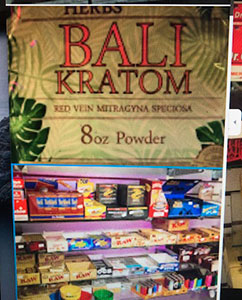Why Are Vape Shops Selling This Dangerous Substance?
By Michael Gold
Kratom sounds like something from an alien world, like Superman’s home planet. Unfortunately, here on Earth, it’s a potentially dangerous, but strangely, still legal substance in the United States.
Kratom is sold in a Carmel vape and smoke shop and throughout the Hudson Valley. It comes from Thailand, Indonesia and other southeast Asian countries, and it’s illegal in all of them.
An employee at the Happy Habits Vape & Smoke Shop (it seems unlikely they were trying to be ironic with the name) in Carmel told me on the phone that the shop sells kratom in capsule and powder form, and even as liquid shots. A 30-capsule bag costs under $10.
The product is supposed to give the user a relaxing, uplifting feeling. It can be used as a substitute for opioids, the employee said. The shop “sells a lot of kratom,” he told me.
The Food and Drug Administration (FDA) conducted lab tests on 30 Kratom products and found that they contain “significant levels of lead and nickel” that “exceed safe exposure.”
“Based on these test results,” the FDA’s website states, “the typical long-term kratom user could potentially develop heavy metal poisoning, which could include nervous system or kidney damage, anemia, high blood pressure, and/or increased risk of certain cancers.”
The American Kratom Association (AKA) claims kratom is a safe herbal supplement that can be used to manage chronic pain or boost your energy. The AKA also promotes it to help withdraw from opioid addiction and claims the substance can be used to treat migraine headaches, anxiety, depression, arthritis, insomnia, ADHD and ADD.
The FDA declares that kratom is “a health fraud scam. These products have not been demonstrated to be safe or effective for any use.”
“The biggest driver for me is that it (kratom) is not something to be sold over the counter,” said Paul Lavella, founder and director of the Florham Park, N.J.-based NJ Recovery & Wellness, which treats people for substance abuse disorders.
Kratom has opiate-like properties, Lavella explained. In small amounts, users can become more alert. In higher doses, the user might feel euphoria, achieving “a bliss point, where nothing else in the world is mattering.”
“This substance has potential for addiction,” he said.
The more you take the drug, the more you need to consume to achieve the same feeling. The user will suffer withdrawal if they don’t get enough, including edginess, sleeplessness and moodiness, Lavella stated.
“I don’t think it’s too safe,” said Nelson Hadler, an alcohol and drug addiction counselor with 30 years of experience in New Jersey and now Florida.
“Kratom is not well-understood. People can make money off it and we don’t know the effects. We don’t know what’s in it,” Hadler also mentioned.

In Florida, you can buy it in gas stations and head shops. Not only can kratom contain heavy metals, but also fentanyl, Hadler explained, because sellers mix other substances into it. Fentanyl can increase the rate of respiratory failure and death, he said.
Multiple bills to restrict the sale of kratom have been introduced in the New York State legislature, but there has been no action on them yet. One would ban its sale to people under age 21, another under age 18.
Pleasantville Police Lt. Jesse Wollman explained that “in the village, we have not seen it. We are going to monitor it.”
“It’s one of those things that’s sold as benign, but it could be dangerous to public health,” Wollman said. “You have to be cautious about what you ingest, because you don’t know if that substance could have an adverse effect on you,” he explained.
“Poison control centers in the United States received about 1,800 reports involving use of kratom from 2011 to 2017, including reports of death,” the Mayo Clinic states on its website. “About half of these exposures resulted in serious negative outcomes such as seizures and high blood pressure.”
When it comes to product claims for kratom, it helps to examine the motivations of the parties involved. The FDA’s mission is to keep people safe, so consumers know that when they are ingesting drugs or food or using other products, they’re doing so without fear of harm. That is the agency’s only motivation – to keep people from getting hurt.
The people selling kratom have one motivation – to sell more kratom, to make more money. So, any claims vendors make about kratom should be taken with a million grains of salt. Likewise, when kratom sellers minimize the dangers of this substance, their statements should be treated with extreme skepticism.
Multiple calls to the American Kratom Association for comment went unanswered.
We need to question why such a potentially hazardous product can be sold to anyone who walks into a vape shop.
Michael Gold has had op-ed articles published in The New York Daily News, The Albany Times-Union, The Virginian-Pilot, The Palm Beach Post, and other newspapers.

Examiner Media – Keeping you informed with professionally-reported local news, features, and sports coverage.
